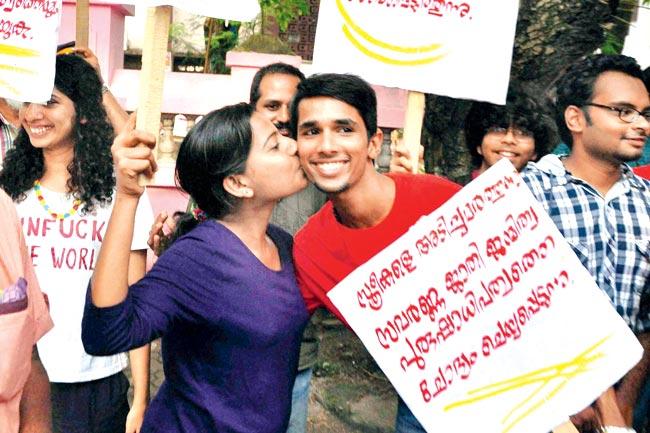“I was stopped by a policeman the other day for wearing an earring and a hair band,” a young man told a group of people in Mumbai last weekend.

 “I was stopped by a policeman the other day for wearing an earring and a hair band,” a young man told a group of people in Mumbai last weekend. He, like many members of the audience participating in a discussion about women’s rights and whether one universal law applied, wanted to know why and how their individual rights were trampled on by the might of the collective so easily in India.
“I was stopped by a policeman the other day for wearing an earring and a hair band,” a young man told a group of people in Mumbai last weekend. He, like many members of the audience participating in a discussion about women’s rights and whether one universal law applied, wanted to know why and how their individual rights were trampled on by the might of the collective so easily in India.
ADVERTISEMENT
In Kerala, a news channel ran a “sting operation” about a cafe where young people drank coffee and there possibly was some kissing. This led to a political party vandalising the cafe and other parties applauding. The news channel and the politicians were both trying to “save” Indian culture from such Western abominations as kissing and perhaps even drinking coffee in a cafe.

Make love, not war: A girl kisses a boy as a sign of support to the ‘Kiss of Love’ protest rally, in Kochi on Sunday Pic/PTI
Women have been told that wearing jeans and using mobile phones can lead to rape by no less than the police in Uttar Pradesh.
Even as there is a strong “conservative” section running through Indian society that is loud in its disapproval and getting increasingly more vocal and violent, there are also those Indians who would like to think for themselves and exercise the rights that are theirs by Constitutional mandate. Men might want to wear earrings or some people might want to kiss in a cafe or women might want to wear jeans. They do not want to be told that they are overstepping some artificial cultural boundaries. Do they deserve a voice or must they be permanently damned and hidden for being too “Western” or too “liberal”?
And yet, there are enough resistance movements from the young and enough people willing to talk about issues like sex and gender and human rights without being prurient or salacious but with good humour and honesty as I discovered at a couple of public talks this week. There is a palpable need for the young to see old shibboleths being destroyed without leading to breast-beating about the imminent collapse of Indian culture.
The whole bogey of Indian culture, though, is usually raised by those who are not interested in culture in the sense of art or music or literature but more to do with customs and traditions which they see as inviolate. Logic and reasoning do not work here and the “India is the land of the Kama Sutra” argument always falls flat. The point is not the existence of the Kama Sutra. It is: what are you doing reading it.
The entire “love jihad” campaign can also be seen as a campaign against young love where parents are just trying to control their children long after they have stopped being children. That it allows communal tensions to rise and for elections to be won is just an additional political bonus. The political outrage feeds off conservative fears of change and of losing control. Needless to say, you can substitute the regressive, suppressive elements of any religion and see the same vicious, dangerous effects.
Our political leaders of all colours and hues and dispensations continue with their desperate, ham-handed, bludgeoning and ignorant ways to control our culture and our lives. They talk a lot about the importance of youth but that is just lip service to their real goal which is the importance of status quo.
Playing on cultural fears is the oldest and easiest way to arouse anger and to get out of doing any actual work. You can rest assured that any political party or government which concentrates on saving “culture” is empty of ideas. Or more correctly, its main idea is to get votes by playing on fear.
The hypocrisy is evident when the same people push for improved technology or modernisation of processes and machines. You applaud the use of computers but you don’t like the freedom that using a computer hands to someone else. You want bullet trains but you want women to wear burkhas in public or stay at home and make chapatis. You want more education but you don’t know what to do with the opening of minds that education carries with it.
Sadly for the regressive, this is usually an irreversible process. The worms are out and they’re turning.
Ranjona Banerji is a senior journalist. You can follow her on twitter @ranjona
 Subscribe today by clicking the link and stay updated with the latest news!" Click here!
Subscribe today by clicking the link and stay updated with the latest news!" Click here!






